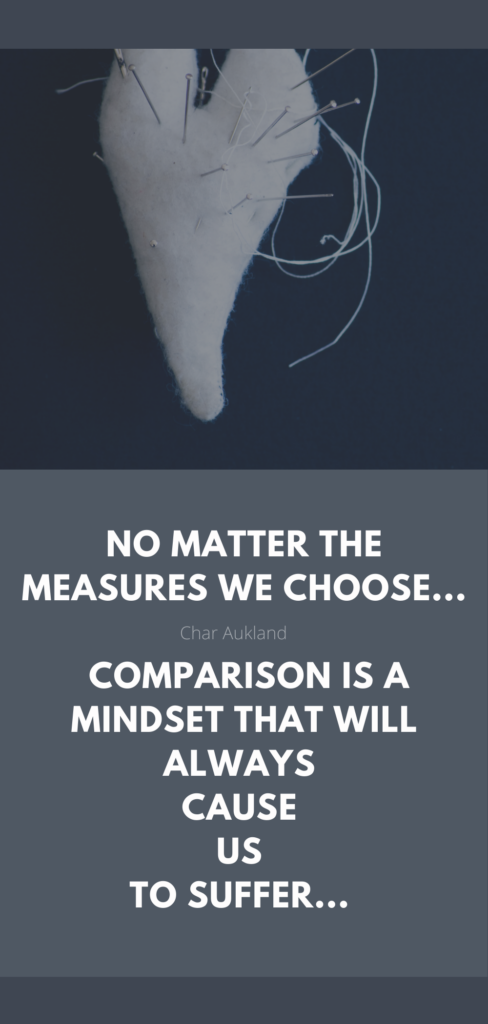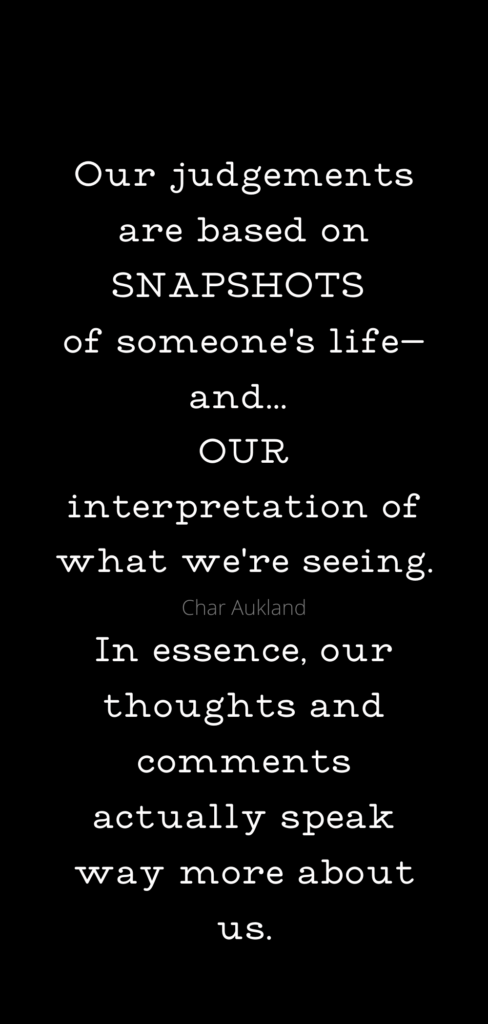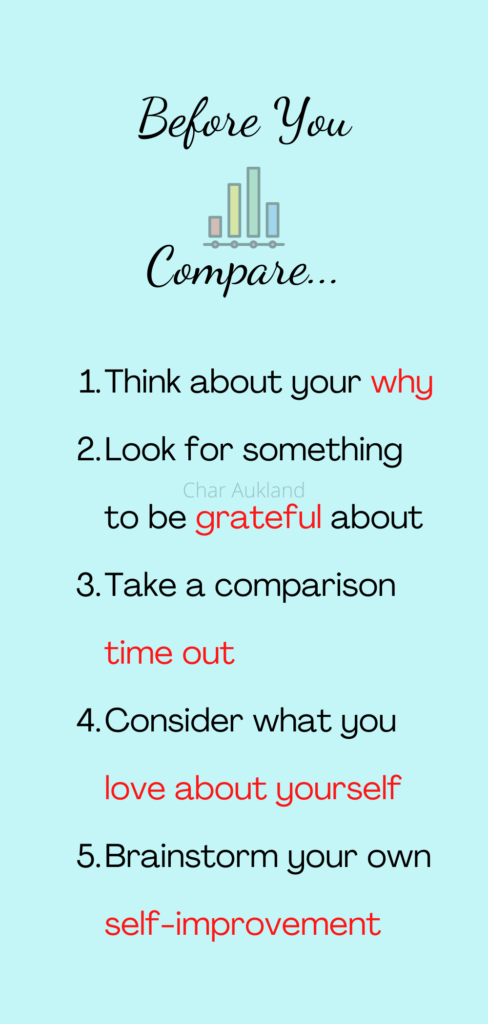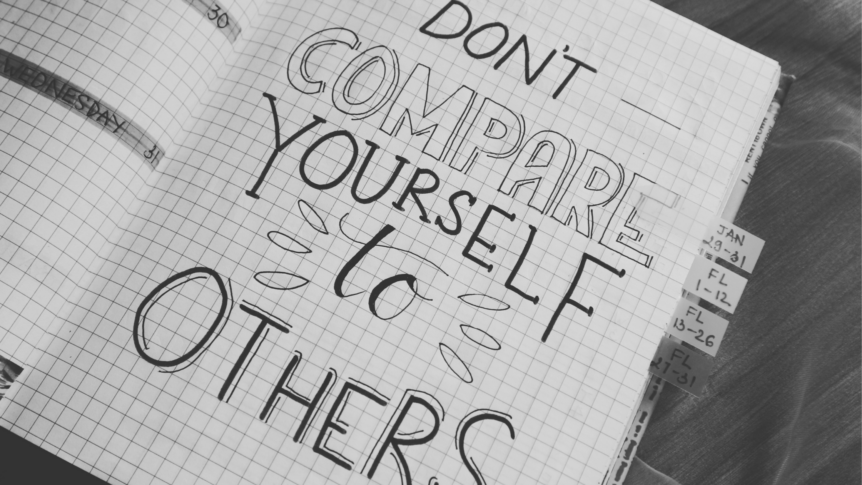Comparison is a tendency that is common to our human nature—and in one form or another, we’ve all had our run-ins with it.
Sometimes, our instinct to compare can be so automatic, we don’t catch it until it’s happening…and often, we end up holding the short end of the stick.
Sadly, the more we make this behavior a habit, the more we indulge in it— and are consumed by it.

Consequences of Comparing
Comparison is blinding, debilitating, and destructive—especially when we only see ourselves in contrast to someone else. Thinking in terms of -er never produces a true winner.
- Prettier
- Smarter
- Richer
- Sexier
- Friendlier
- More, better, etc…
No matter the measures we choose, comparison is a mindset that causes us to suffer in ways that will only continue to tear us down… instead of building us up.
When we focus on what we lack, we miss out on the opportunity to capitalize on our:
- uniques strengths
- improve our weaknesses
- appreciate the person we are
- live authentically
Not only does comparison get us nowhere, but comparing and contrasting ourselves (and our lives) can have seriously devastating effects on our mental, emotional, and spiritual health.
Listed below are just a few comparison induced consequences we can face….
We Become Disillusioned
The more we measure ourselves based on other people, the more we look at our lives (and the people in them) as not being good enough.
Once that becomes our perspective, our thoughts and behaviors toward our surroundings will shift.
Rather than treating our possessions and relationships with respect, we are more likely to cultivate roots of bitterness and possibly even contempt. This attitude can have a devastating effect on how we relate to others—and ourselves.
Inevitably, we will look in the mirror and see someone who, also, isn’t good enough.
Our Self-esteem is Lowered
There have been times when I walked out of the house feeling pretty good about myself — only to have those feelings disappear when I began the comparison process.
There is one day, in particular, that stands out in my mind.
At my local gym, there was a woman that I can only describe as an Amazonian Barbie. Until she walked in, I felt fine. As everyone’s attention seemed to turn towards her, my self-esteem wilted, my ego deflated, and my envy was triggered. Sadly, for many of us, this is all too common.
It’s hard to love our neighbors as we love are ourselves when we don’t value who we are.
The more we focus on someone else’s attributes, the more we lose sight of our own.
Our Egos are Inflated
At the opposite end of the self-esteem spectrum is the inflated ego. There are times when we look at others and feel smarter, morally superior, or as if we are just generally better. We become prideful.
This type of mindset is devoid of love, compassion, and empathy. It also says quite a bit about what’s going on within us.
It’s as if we convince ourselves that we are somehow more exceptional than our target.
When we need to be “better” than someone, in order to feel good about ourselves, we need to take a step back and a look within.
We Develop Judgmental Attitudes
Along the lines of feeling superior is the judgmental mental throne we sit on. The more we critique others, the more our attitude reflects our thoughts.
But what does judging get us? Once we’ve assessed someone in a negative light, does that legitimately make us a better person? What does it add to our character?
Good questions to ask ourselves are, “What am I gaining from the judgmental comparison?” and “How is it helping me to grow as an individual?”
We also need to wrap our minds around the fact that we don’t (and won’t) know the whole story of what we’re seeing. Our judgements are based on snapshots of someone’s life— and, our interpretation of what we’re seeing.
In essence, our thoughts and comments actually speak way more about us.

Using Comparison to Our Benefit
Thankfully, there’s hope. Listed below are four ways we can use comparison to help build our confidence, while freeing ourselves from the need to compare.
Look Within
Comparison let us know that we have an inner conflict. When we feel tempted to compare ourselves, we can take steps to understand what’s happening and counter it.
Understanding where the comparison is coming from will help us target areas that are sources of pain in our spirit. For example, I took a long hard look at my feelings about myself when I had that experience at the gym.
Instead of continuing to sulk, I decided to take measures to change how I felt about myself physically and emotionally.
The result was a change in eating habits, thinking habits, and an improvement in my overall health—especially mentally.
Develop Your Gratitude
Since comparison highlights areas in which we are dissatisfied, it can give us the opportunity to take actionable steps to change our perspective and develop gratitude for what’s right in our lives. The next time you’re tempted to compare, try the following:
- Think about what you were being tempted to compare and why.
- Now, look around your life and actively search for things to be grateful about.
- Take a comparison timeout and consider what you love about yourself.
- Name 3 great things about your relationships and friendships.
- Identify one thing that you can do, today, that would improve your satisfaction with your life or yourself.
Appreciate Yourself
What makes you special and unique? If you can’t answer that (satisfactorily), then ask yourself what can you do to add value to yourself (in your eyes)?
Once we learn to appreciate ourselves for who we are, our confidence becomes a tool to build an even stronger foundation. It also decreases the likelihood of being threatened by someone else’s confidence.
We also cut down on our reliance on other people’s opinions to feel a sense of value. Learning to appreciate ourselves adds an internal meter that doesn’t depend on external validation—or lack of recognition.
Self-Improvement
Self-improvement is just that—improving yourself for yourself. Disregard the naysayers and focus on becoming a mentally, emotionally, spiritually, and physically healthier you!
Instead of hanging out at the short end of the stick, use your thoughts to your benefit. Look at the areas in which you feel deficient and brainstorm ways to improve—one step at a time.
This was a tough one for me, in some aspects.
I was a people-pleaser for so long, I was afraid of what people would think about my new approach to life. Although there were a few sneaky detractors, I quickly understood that their opinions revolved around their own inner conflict. With that understanding, I was able to just be me—fearlessly.



